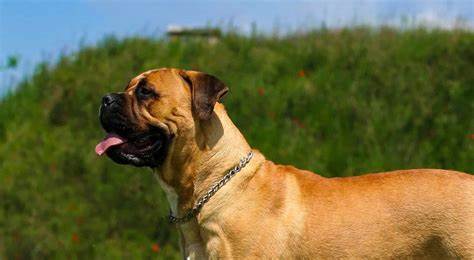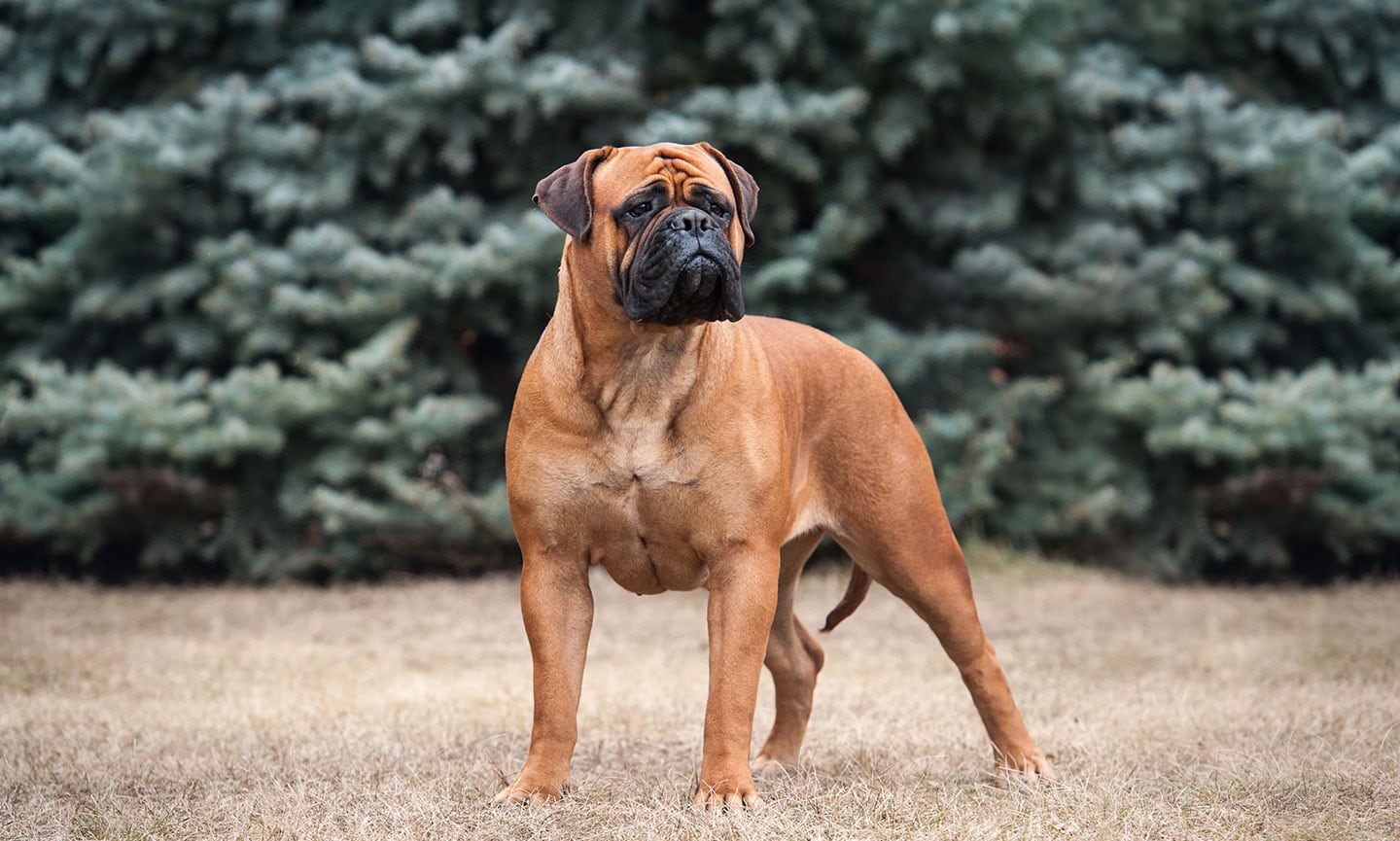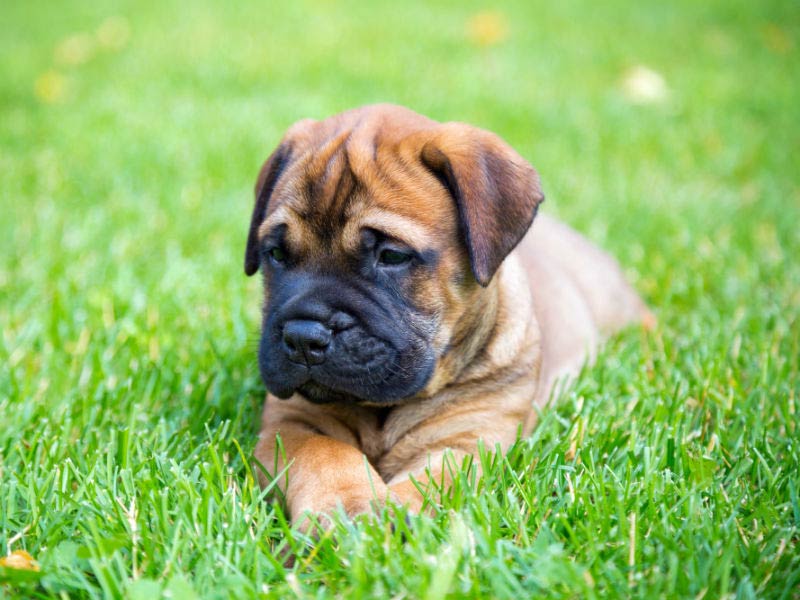
The Bullmastiff is a large and powerful guardian breed that originated in England during the 19th century. It was developed by gamekeepers who needed a strong yet agile dog to guard estates and catch poachers. By crossing the Bulldog with the Mastiff, breeders created a dog that was faster than the Mastiff and stronger than the Bulldog, giving rise to the Bullmastiff.
These dogs were highly valued for their silent yet fearless guarding abilities, capable of tackling intruders without excessive aggression. Recognized by the American Kennel Club (AKC) in 1933, the Bullmastiff has since gained popularity as a loyal family protector and a working dog in security and law enforcement.
The Bullmastiff is a favorite among families, estate owners, and security professionals due to its protective instincts and calm temperament.
Despite its large size, the breed is known for being gentle and affectionate with family members, making it an excellent home companion as well as a reliable guardian.
The Bullmastiff is a large, muscular breed with a powerful build and a confident stance.
• Coat: Short, dense, and low-maintenance, coming in fawn, red, or brindle, often with a black mask.
• Size: Males stand 25 to 27 inches tall and weigh 110 to 130 pounds, while females are slightly smaller.
• Head & Expression: The breed has a broad, square-shaped head, dark expressive eyes, and a strong muzzle.
• Ears: Medium-sized, set high and folded.
• Body: Compact, well-muscled, and built for strength and endurance.
The Bullmastiff is known for its protective, loyal, and affectionate nature, making it an excellent guard dog and family companion.
• Fearless Guardian: Naturally protective, the Bullmastiff is wary of strangers but not overly aggressive.
• Calm and Gentle with Family: Despite its size, it is affectionate and loving with children and owners.
• Intelligent and Trainable: While independent, Bullmastiffs respond well to consistent training and firm leadership.
• Low Exercise Needs: Unlike some working breeds, the Bullmastiff is calm indoors and requires only moderate exercise.
• Quiet and Observant: Not prone to excessive barking but will alert owners when necessary.

For those seeking a loyal, courageous, and affectionate protector, the Bullmastiff is an excellent choice.
• Ideal for Guarding Homes and Families: Naturally protective without being overly aggressive.
• Loyal and Affectionate: Forms deep bonds with its owners.
• Great for Families with Space: Thrives in homes with a yard but can adapt to indoor living with enough exercise.
• Minimal Grooming Needs: Short coat is easy to maintain.
• Not Excessively Active: Requires moderate exercise but is content relaxing indoors.
The Bullmastiff requires proper training, socialization, and health monitoring to thrive.
• Grooming: Weekly brushing and occasional baths are sufficient.
• Exercise: Needs daily walks but does not require intense physical activity.
• Mental Stimulation: Enjoys obedience training, interactive play, and socialization.
• Nutrition: A balanced diet supports its large size and muscle mass.
• Training and Socialization: Early exposure to new people and environments is essential for a well-mannered dog.
Bullmastiffs are generally healthy, but like all large breeds, they are prone to certain conditions.
• Hip and Elbow Dysplasia: Common in large breeds, affecting mobility.
• Bloat (Gastric Torsion): A life-threatening condition in deep-chested breeds; feeding smaller meals can help reduce the risk.
• Heart Conditions: Some Bullmastiffs may develop aortic stenosis, a congenital heart issue.
• Obesity: Portion control and regular exercise are important for maintaining a healthy weight.
• Cancer: Some Bullmastiffs may be predisposed to mast cell tumors and lymphoma.

Compared to the English Mastiff, the Bullmastiff is more agile and slightly smaller, making it more manageable for many owners. Unlike the Rottweiler, which has a higher energy level, the Bullmastiff is more laid-back and requires less exercise.
Compared to the Doberman, the Bullmastiff is less intense and more independent, though both breeds excel in protection work.
The Bullmastiff is perfect for experienced dog owners who want a loyal, protective, and affectionate guardian. If you are looking for a low-maintenance yet strong and courageous companion, the Bullmastiff will be an excellent fit.
However, if you prefer a small or highly active breed, or do not have space for a large dog, the Bullmastiff may not be the best choice.
United Pet Club is here to help you find the perfect Bullmastiff companion. Whether you're looking to adopt or connect with trusted breeders, we provide valuable resources to guide you every step of the way.
Explore our platform to learn more about Bullmastiffs, their history, and how to care for them. Contact United Pet Club today to start your journey with this fearless and devoted guardian!